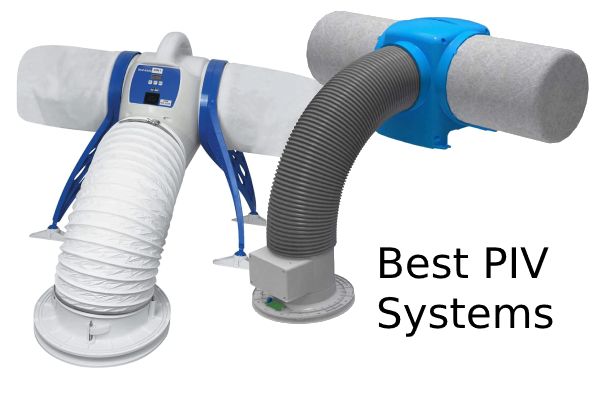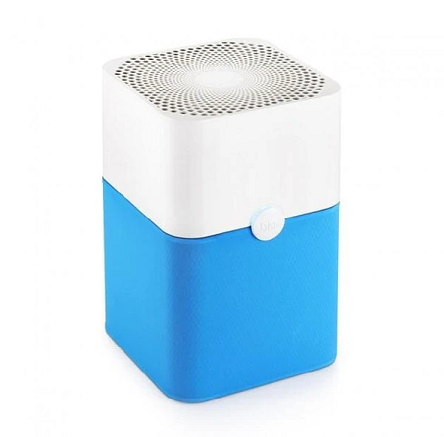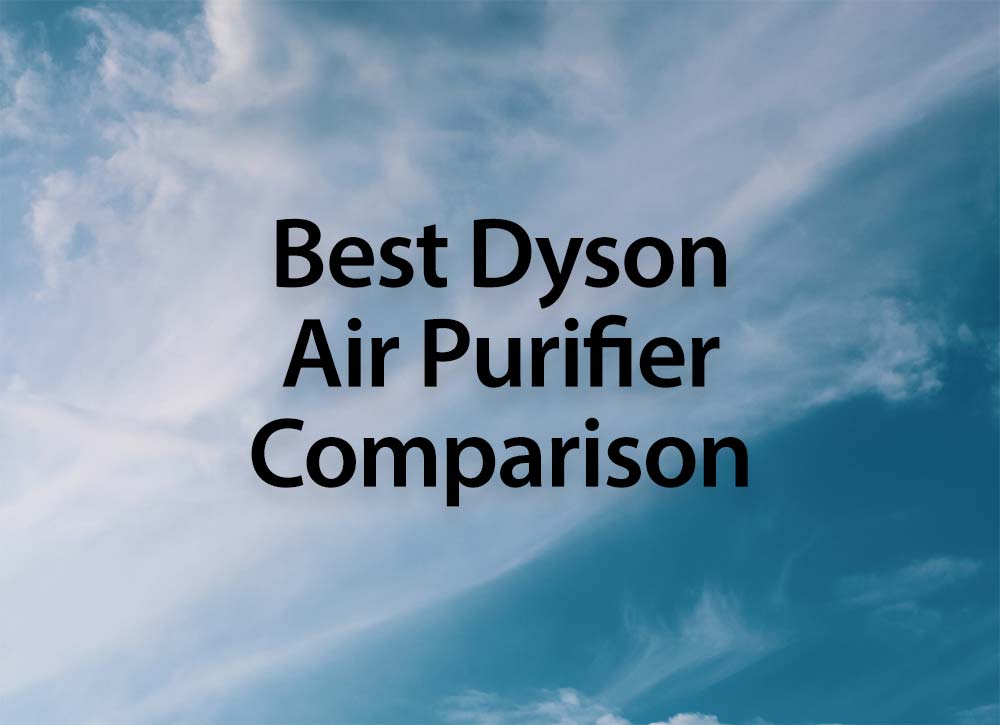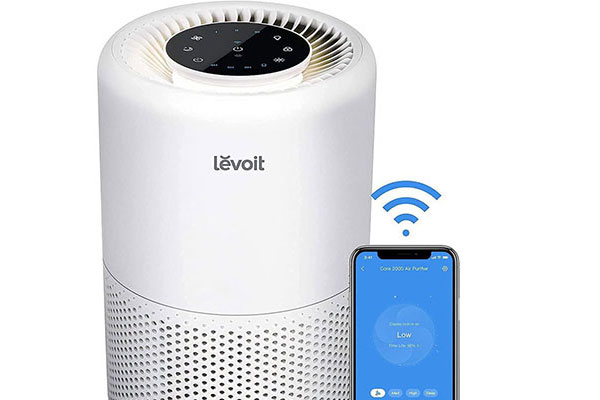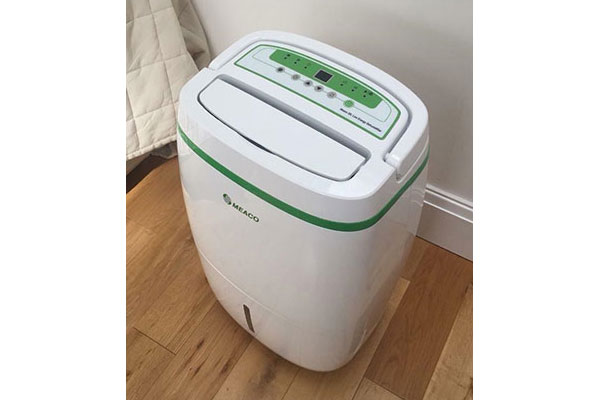Ioniser vs Air Purifier Comparison
Ionizers and air purifiers are two different types of devices that are designed to improve indoor air quality. The better option for you will depend on your specific needs and circumstances. Many air purifiers on the market now come with an ionizer function included too.
Ionizers work by releasing negative ions into the air, which attach to positively charged particles such as dust, pollen, and smoke, causing them to become heavy and fall to the ground. Ionizers are often marketed as being effective at reducing allergens, improving respiratory health, and neutralizing odors.
| Quick comparison | Ioniser | Air Purifier |
| Air filters | ❌ No | ✅ Yes |
| More effective | ❌ No | ✅ Yes |
| Realese of negative ions | ✅ Yes | ✅ Optional |
| Cheaper to run | ✅ Yes | ❌ No |
| Cheaper to buy | ✅ Yes | ❌ No |
| Smaller and lighter | ✅ Yes | ❌ No |
| Quieter | ✅ Yes | ❌ No |
| Healthier to use | ❌ No | ✅ Yes |
| Portable neck models | ✅ Yes | ❌ No |
| Filters need replacing | ❌ No | ✅ Yes |
| Lower maintenance | ✅ Yes | ❌ No |
However, ionizers do not actually remove particles from the air, which means that they can still accumulate on surfaces and potentially be re-introduced into the air if disturbed. Additionally, some studies have suggested that high concentrations of negative ions may have negative health effects, such as respiratory irritation and headache.
Air purifiers, on the other hand, use filters to capture particles and other pollutants from the air. There are different types of filters available, including HEPA filters, activated carbon filters, and UV-C filters. Air purifiers can be effective at removing a wide range of pollutants, including allergens, smoke, dust, and bacteria.
Overall, air purifiers are generally considered to be more effective at improving indoor air quality than ionizers. However, it’s important to choose a high-quality air purifier with an appropriate filter for your needs. Additionally, both ionizers and air purifiers can produce ozone, a lung irritant, so it’s important to choose models with low or no ozone emissions.
In the UK, you can look for air purifiers and ionizers that meet the standards set by the Association of Home Appliance Manufacturers (AHAM) or the European Union.
Best ionisers to use at home
PureMate Ionic Air Purifier
The ionic air movement technology in this product uses a static electric dust collector to capture airborne pollutants such as dust, pollen, and allergens. It circulates negative ions and active oxygen to clean particles as small as 0.01 micron, without the use of mechanical parts. The product is soundless, energy-efficient, and cost-effective, using only 3.4 watts of power. It also features a compact design, no filter replacement, and virtually silent operation.
Pros
✅ Effective at neutralizing odors and making the room smell fresh
✅ Compact and energy-efficient
✅ No need for scent pellets
✅ Silent operation with no moving parts
✅ Easy to clean
✅ Can be used in a car (12V power)
Cons
❌ Produces a gentle waft of ozone
❌ Can make static noises due to moisture in the air
❌ May only work well for small to medium-sized rooms

PureMate Ionic Air Purifier Features
- Effective up to 15m2
- Clean particles up to 0.01 micron
- Weight: 0.75kg
- Power: 3.4 watts
Pro Breeze® 3-in-1 Mini Air Purifier with Ioniser
This air purifier offers 3-in-1 air purification, capturing up to 99.97% of airborne particles, dust, pollen, smoke, odours, mould, and pet dander with a pre-filter and true HEPA filter. It also features a built-in negative ion generator that produces powerful negative ions to bind and neutralize airborne pollutants for a cleaner environment. The device can be powered by a USB or mains adaptor and functions as a personal air purifier, creating a halo of fresh air around the user at work or while sleeping. Additionally, the purifier features an LED night light that can be turned on or off, creating a relaxing environment perfect for children and babies’ bedrooms. This device is ideal for pet owners, smokers, children, babies, or anyone looking to improve air quality, remove unwanted smells, and prevent harmful pollutants in their home or workspace.
Pros
✅ Small and compact design
✅ HEPA filter captures up to 99.97% of particles
✅ Optionaly USB powered
✅ LED night light
✅ Effective for small rooms
Cons
❌ Not effective for medium and larger rooms
❌ Not that quiet for bedroom

Pro Breeze® 3-in-1 Mini Air Purifier Features
- Captures up to 99.97% of airborne particles
- CADR Rating of 11.9m³/hr
- USB and mains adaptor
Portable neck ionisers
Ionisers can come in various forms, including small and portable ones that can be worn around the neck or carried in a pocket. These portable ionizers are often designed to emit negative ions, which are believed to help improve air quality by neutralizing pollutants and allergens. Some people also use portable ionizers to help reduce stress and improve overall well-being. However, it’s important to note that the effectiveness of portable ionizers can vary, and more research is needed to fully understand their benefits and potential risks.
What are the benefits of an ioniser?
- Improved air quality: Ionisers can help to remove allergens and other particles from the air, which can be particularly helpful for people with allergies, asthma, or other respiratory conditions.
- Odor elimination: Ionisers can help to neutralize unpleasant odors in the air, such as smoke or cooking smells.
- Increased energy levels: Some people believe that negative ions can have a positive effect on mood and energy levels, potentially leading to improved mental clarity and reduced feelings of fatigue.
- Cost-effective: Ionisers are often less expensive than air purifiers and do not require replacement filters, which can save money over time.
- Quiet operation: Ionisers are typically very quiet when in operation, making them a good option for use in bedrooms or other quiet spaces.
Do ionizers use a lot of electricity?
Ionizers generally use very little electricity, as they do not require a motor or fan to operate like some air purifiers do.
Most ionizers use only a few watts of power, which is comparable to the energy usage of a small nightlight.
However, it’s important to note that some ionizers may have additional features that can increase their energy consumption, such as built-in air quality sensors or timers. Additionally, if you are running multiple ionizers or other electronic devices in your home, your overall electricity usage may be higher.
Ionisers – FAQ
Is ionized air good to breathe?
Breathing ionized air can have both positive and negative effects on health, depending on the concentration of ions in the air and other factors. While ionized air can have some benefits, it’s important to use air ionizers safely and in conjunction with other measures to ensure the air in your home or office is as clean and healthy as possible.
Can I sleep with an air ioniser?
It is generally safe to sleep with an air ionizer running, but it’s important to choose a high-quality product, use it safely, and be aware of any potential risks or negative effects such as ozone emissions. Some people may experience discomfort or irritation from breathing ionized air.
Do ionisers get rid of dust?
Ionisers can help to reduce the amount of dust in the air by causing the particles to become heavy and fall to the ground or attach to surfaces, but they do not physically remove particles from the air like air purifiers with filters do.
What are the side effects of ionizer?
The potential side effects of ionizers include ozone emissions, respiratory irritation, headaches, surface build-up, and health risks associated with high concentrations of negative ions. It’s important to choose a high-quality product, use it safely, and be aware of any potential risks or negative effects.
When should you use an ionizer?
An ionizer can be used to improve indoor air quality by reducing the amount of airborne particles and neutralizing odors. It can be particularly helpful for allergy and asthma relief, odor elimination, and in areas with high outdoor pollution levels.
Conclusion
In conclusion, the choice between an ioniser and an air purifier depends on your specific needs and preferences. Both devices have their own strengths and weaknesses, and there is no one-size-fits-all solution. Ionisers can be more affordable and low-maintenance, but may produce small amounts of ozone, which can be harmful to some people. Air purifiers are generally more effective at removing particles and pollutants from the air, but can be more expensive and require regular filter changes. Ultimately, it’s important to do your research and choose a device that meets your specific needs and is backed by reliable scientific evidence. Consult with a healthcare professional if you have any concerns about indoor air quality or respiratory health.
Last update on 2025-02-28 / Affiliate links / Images from Amazon Product Advertising API


